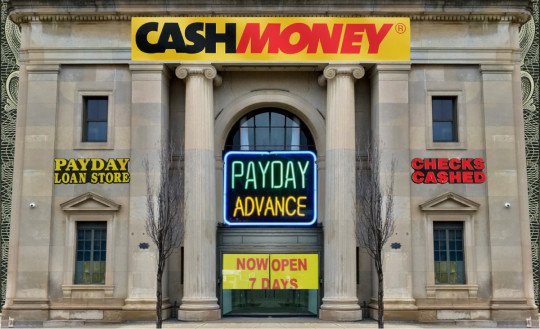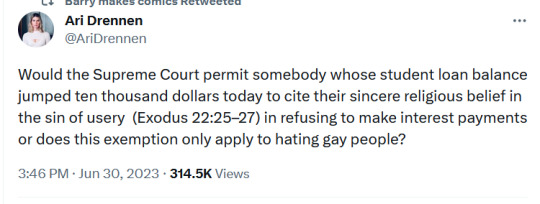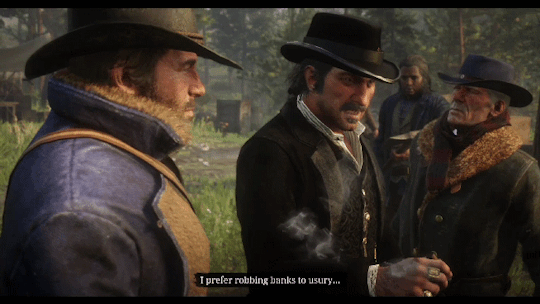#usury
Text
When you hear "fintech," think "unlicensed bank"

Tomorrow (May 2) I’ll be in Portland at the Cedar Hills Powell’s with Andy Baio for my new novel, Red Team Blues.

In theory, patents are for novel, useful inventions that aren’t obvious “to a skilled practitioner of the art.” But as computers ate our society, grifters began to receive patents for “doing something we’ve done for centuries…with a computer.” “With a computer”: those three words had the power to cloud patent examiners’ minds.
If you’d like an essay-formatted version of this post to read or share, here’s a link to it on pluralistic.net, my surveillance-free, ad-free, tracker-free blog:
https://pluralistic.net/2023/05/01/usury/#tech-exceptionalism
Patent trolls — who secure “with a computer” patents and then extract ransoms from people doing normal things on threat of a lawsuit — are an underappreciated form of “tech exceptionalism.” Normally, “tech exceptionalism” refers to bros who wave away things like privacy invasions by arguing that “with a computer” makes it all different.
These tech exceptionalists are the legit face of tech exceptionalism, the Forbes 30 Under 30 set. They’re grifters, but they’re celebrated grifters. There’s a whole bottom-feeding sludge of tech exceptionalists that don’t get the same kind of attention, like patent trolls.
Oh, and the fintech industry.
As Riley Quinn says, “when you hear ‘fintech,’ think: ‘unlicensed bank.’” The majority of fintech “innovation” consists of adding “with a computer” to highly regulated activities and declaring them to be unregulated (and, in the case of crypto, unregulatable).
There are a lot of heavily regulated financial activities, like dealing in securities (something the crypto industry is definitely doing and claims it isn’t). Most people don’t buy or sell securities regularly — indeed, most Americans own little or no stocks.
But you know what regulated financial activity a lot of Americans participate in?
Going into debt.
As wages stagnate and the price of housing, medical care, childcare, transportation and education soar, Americans fund their consumption with debt. Trillions of dollars’ worth of debt. Many of us are privileged to borrow money by walking into a bank and asking for a loan, but millions of Americans are denied that genteel experience.
Instead, working Americans increasingly rely on payday lenders and other usurers who charge sky-high interest rates, on top of penalties and fees, trapping borrowers in an endless cycle of indebtedness. This is an historical sign of a civilization in decline: productive workers require loans to engage in useful activities. Normally, the activity pans out — the crop comes in, say — and the debt is repaid.
But eventually, you’ll get a bad beat. The crop fails, the workshop burns down, a pandemic shuts down production. Instead of paying off your debt, you have to roll it over. Now, you’re in an even worse situation, and the next time you catch a bad break, you go further into debt. Over time, all production comes under the control of creditors.
The historical answer to this is jubilee: a regular wiping-away of all debt. While this was often dressed up in moral language, there was an absolutely practical rationale for it. Without jubilee, eventually, all the farmers stop growing food so that they can grow ornamental flowers for their creditors’ tables. Then, as starvation sets in, civilization collapses:
https://pluralistic.net/2022/07/08/jubilant/#construire-des-passerelles
As the debt historian Michael Hudson says, “Debts that can’t be paid, won’t be paid.” Without jubilee, indebtedness becomes a chronic and inescapable condition. As more and more creditors attach their claims to debtors’ assets, they have to compete with one another to terrorize the debtor into paying them off, first. One creditor might threaten to garnish your paycheck. Another, to repossess your car. Another, to evict you from your home. Another, to break your arm. Debts that can’t be paid, won’t be paid — but when you have a choice between a broken arm and stealing from your kid’s college fund or the cash-register, maybe the debt can be paid…a little. Of course, digital tools offer all kinds of exciting new tools for arm-breakers — immobilizing your car, say, or deleting the apps on your phone, starting with the ones you use most often:
https://pluralistic.net/2021/04/02/innovation-unlocks-markets/#digital-arm-breakers
Under Trump, payday lenders romped through America. A lobbyist for the payday lenders became a top Trump lawyer:
https://theintercept.com/2017/11/27/white-house-memo-justifying-cfpb-takeover-was-written-by-payday-lender-attorney/
This lobbyist then oversaw Trump’s appointment of a Consumer Finance Protection Bureau boss who deregulated payday lenders, opening the door to triple digit interest rates:
https://www.latimes.com/business/lazarus/la-fi-lazarus-cfpb-payday-lenders-20180119-story.html
To justify this, the payday loan industry found corruptible academics and paid them to write papers defending payday loans as “inclusive.” These papers were secretly co-authored by payday loan industry lobbyists:
https://www.washingtonpost.com/business/2019/02/25/how-payday-lending-industry-insider-tilted-academic-research-its-favor/
Of course, Trump doesn’t read academic papers, so the payday lenders also moved their annual conference to a Trump resort, writing the President a check for $1m:
https://www.propublica.org/article/trump-inc-podcast-payday-lenders-spent-1-million-at-a-trump-resort-and-cashed-in
Biden plugged many of the cracks that Trump created in the firewalls that guard against predatory lenders. Most significantly, he moved Rohit Chopra from the FTC to the CFPB, where, as director, he has overseen a determined effort to rein in the sector. As the CFPB re-establishes regulation, the fintech industry has moved in to add “with a computer” to many regulated activities and so declare them beyond regulation.
One fintech “innovation” is the creation of a “direct to consumer Earned Wage Access” product. Earned Wage Access is just a fancy term for a program some employers offer whereby workers can get paid ahead of payday for the hours they’ve already worked. The direct-to-consumer EWA offers loans without verifying that the borrower has money coming in. Companies like Earnin claim that their faux EWA services are free, but in practice, everyone who uses the service pays for the “Lightning Speed” upsell.
Of course they do. Earnin charges sky-high interest rates and twists borrowers’ arms into leaving a “tip” for the service (yes, they expect you to tip your loan-shark!). Anyone desperate enough to pay triple-digit interest rates and tip the service for originating their loan is desperate and needs to the money now:
https://prospect.org/power/05-01-2023-fintech-ewa-payday-loan-scam/
EWA annual interest rates sit around 300%. The average EWA borrower uses the service two or three times every month. EWA CEOs and lobbyists claim that they’re banking the unbanked — but the reality is that they’re acting as sticky-fingered brokers between banks and young, poor workers, marking up traditional bank services.
This fact is rarely mentioned when EWA companies lobby state legislatures seeking to be exempted from usury rules that are supposed to curb predatory lenders. In Vermont, Earnin wants an exemption from the state’s 18% interest rate cap — remember, the true APR for EWA loans is about 300%.
In Texas, payday lenders are classed as loan brokers, not loan originators and are thus able to avoid the state’s usury caps. EWAs are lobbying the Texas legislature for further exemptions from state money-transmitter and usury limit laws, principally on the strength of the “it’s different: we do it with a computer” logic.
But as Jarod Facundo writes for The American Prospect, quoting Monica Burks from the Center for Responsible Lending, a loan is a loan even if it’s with a computer: “The industry is trying to create a new definition for what a loan is in order to exempt themselves from existing consumer protection laws… When you offer someone a portion of money on the promise that they will repay it, and often that repayment will be accompanied with fees or charges or interest, that’s what a loan is.”

Catch me on tour with Red Team Blues in Mountain View, Berkeley, Portland, Vancouver, Calgary, Toronto, DC, Gaithersburg, Oxford, Hay, Manchester, Nottingham, London, and Berlin!


[Image ID: A stately, columnated bank building, bedecked in garish payday lender signs.]

Image:
Andre Carrotflower (modified)
https://commons.wikimedia.org/wiki/File:30_North_%28former_Pontiac_Commercial_%26_Savings_Bank_Building%29,_Pontiac,_Michigan_-_entrance_and_Chief_Pontiac_relief_sculpture_-_20201213.jpg
CC BY-SA 4.0
https://creativecommons.org/licenses/by-sa/4.0/deed.en
#pluralistic#cfpb#earned wage access#digital armbreakers#loansharks#payday lenders#tech exceptionalism#jubilee#debt#fintech#usury#michael hudson#graeber#debts that can't be paid wont be paid
670 notes
·
View notes
Text










#mundus#banker#wall street#usury#debt#white washed#capitalist society#demons#gif edit#ps4#dailygaming#gaming edit#capcom#dailyvideogames#ninja theory#dmc devil may cry definitive edition#devil May Cry#dmc sparda#video game photography#kat dmc
32 notes
·
View notes
Text

usury is a sin.
22 notes
·
View notes
Text

#payday loans#usury#moneylenders#money lending#night city#night street photography#night photography#night#streetleaks#streetsnap#street photografie#street photographer#bnw life#bnw captures#bnwzone#bw life#blackandwhitephotography#everybodystreet#bnw addicted
27 notes
·
View notes
Link
Empire of debt slavery
#Federal Reserve#banking cartels#freemasonry#Rothschild#oligarchy#hegemony#imperialism#slavery#usury
6 notes
·
View notes
Quote
There are families in need who cannot work and have nothing to eat. Then along come usurers to take what little they have. Let us #PrayTogether for these families' dignity. And let us pray also for the usurers, that the Lord might touch their hearts and convert them.
Pope Francis
8 notes
·
View notes
Text

Hi! I am Marie, I am very pleased to meet you!
this post will clearly tell a lot about me
#al haytham#fan edit#genshin edit#genshin impact#yae miko#genshin#nahida#all#mari#fol#kids#oddities#usury#kelso#yxuen#laos is#jxxuue#ososcujd#lsksixid#wugsgzvzn#kudus i#midis is#duisburg#jsidis#isolation#bendy and the ink machine#black stories#books & libraries#eren aot#aot smut
4 notes
·
View notes
Text
“First, I should say that taking a usurer’s money by proper authority is not robbery, but recovery of stolen goods.”
— G.K. Chesterton: Utopia of Usurers
6 notes
·
View notes
Photo

MOSAIC LAW ON CHARGING INTEREST -- KJV (King James Version) Bible Verse List Visit https://www.billkochman.com/VerseLists/ to see more. The Mosaic Law and the Prophets strongly condemned the practice of usury -- or charging interest -- between the different tribes of Israel. It was viewed as a selfish, greedy practice. Only to foreigners was it permitted to charge interest, which is why it says "Unto a stranger thou mayest lend upon usury". It is in fact through this greedy practice of charging interest to the Gentile world, that the Jews have enriched themselves. "If thou lend money to any of my people that is poor by thee, thou shalt not be to him as an usurer, neither shalt thou lay upon him usury." Exodus 22:25, KJV "And if thy brother be waxen poor, and fallen in decay with thee; then thou shalt relieve him: yea, though he be a stranger, or a sojourner; that he may live with thee. Take thou no usury of him, or increase: but fear thy God; that thy brother may live with thee. Thou shalt not give him thy money upon usury, nor lend him thy victuals for increase." Leviticus 25:35-37, KJV "Thou shalt not lend upon usury to thy brother; usury of money, usury of victuals, usury of any thing that is lent upon usury: Unto a stranger thou mayest lend upon usury; but unto thy brother thou shalt not lend upon usury: that the LORD thy God may bless thee in all that thou settest thine hand to in the land whither thou goest to possess it." Deuteronomy 23:19-20, KJV "And there was a great cry of the people and of their wives against their brethren the Jews. For there were that said, We, our sons, and our daughters, are many: therefore we take up corn for them, that we may eat, and live. Some also there were that said, We have mortgaged our lands, vineyards, and houses, that we might buy corn, because of the dearth. There were also that said, We have borrowed money for the king's tribute, and that upon our lands and vineyards. Yet now our flesh is as the flesh of our brethren, our children as their children: and, lo, we bring into bondage our sons and our daughters to be servants, and some of our daughters are brought unto bondage already: neither is it in our power to redeem them; for other men have our lands and vineyards. And I was very angry when I heard their cry and these words. Then I consulted with myself, and I rebuked the nobles, and the rulers, and said unto them, Ye exact usury, every one of his brother. And I set a great assembly against them. And I said unto them, We after our ability have redeemed our brethren the Jews, which were sold unto the heathen; and will ye even sell your brethren? or shall they be sold unto us? Then held they their peace, and found nothing to answer. Also I said, It is not good that ye do: ought ye not to walk in the fear of our God because of the reproach of the heathen our enemies? I likewise, and my brethren, and my servants, might exact of them money and corn: I pray you, let us leave off this usury. Restore, I pray you, to them, even this day, their lands, their vineyards, their oliveyards, and their houses, also the hundredth part of the money, and of the corn, the wine, and the oil, that ye exact of them. Then said they, We will restore them, and will require nothing of them; so will we do as thou sayest. Then I called the priests, and took an oath of them, that they should do according to this promise. Also I shook my lap, and said, So God shake out every man from his house, and from his labour, that performeth not this promise, even thus be he shaken out, and emptied. And all the congregation said, Amen, and praised the LORD. And the people did according to this promise." Nehemiah 5:1-13, KJV "He that putteth not out his money to usury, nor taketh reward against the innocent. He that doeth these things shall never be moved." Psalm 15:5, KJV "He that by usury and unjust gain increaseth his substance, he shall gather it for him that will pity the poor." Proverbs 28:8, KJV "But if a man be just, and do that which is lawful and right, And hath not eaten upon the mountains, neither hath lifted up his eyes to the idols of the house of Israel, neither hath defiled his neighbour's wife, neither hath come near to a menstruous woman, And hath not oppressed any, but hath restored to the debtor his pledge, hath spoiled none by violence, hath given his bread to the hungry, and hath covered the naked with a garment; He that hath not given forth upon usury, neither hath taken any increase, that hath withdrawn his hand from iniquity, hath executed true judgment between man and man, Hath walked in my statutes, and hath kept my judgments, to deal truly; he is just, he shall surely live, saith the Lord GOD. If he beget a son that is a robber, a shedder of blood, and that doeth the like to any one of these things, And that doeth not any of those duties, but even hath eaten upon the mountains, and defiled his neighbour's wife, Hath oppressed the poor and needy, hath spoiled by violence, hath not restored the pledge, and hath lifted up his eyes to the idols, hath committed abomination, Hath given forth upon usury, and hath taken increase: shall he then live? he shall not live: he hath done all these abominations; he shall surely die; his blood shall be upon him. Now, lo, if he beget a son, that seeth all his father's sins which he hath done, and considereth, and doeth not such like, That hath not eaten upon the mountains, neither hath lifted up his eyes to the idols of the house of Israel, hath not defiled his neighbour's wife, Neither hath oppressed any, hath not withholden the pledge, neither hath spoiled by violence, but hath given his bread to the hungry, and hath covered the naked with a garment, That hath taken off his hand from the poor, that hath not received usury nor increase, hath executed my judgments, hath walked in my statutes; he shall not die for the iniquity of his father, he shall surely live." Ezekiel 18:5-17, KJV "In thee have they taken gifts to shed blood; thou hast taken usury and increase, and thou hast greedily gained of thy neighbours by extortion, and hast forgotten me, saith the Lord GOD." Ezekiel 22:12, KJV In total contrast to the previous verses which condemn this greedy form of usury in which one person enriched himself at the expense of another, in the New Testament, in the Parable of the Ten Talents, Jesus describes money exchangers -- brokers or bankers -- who paid people interest as a reward for depositing their money in their bank. This is how banks are supposed to operate. However, sadly, banks have become extremely greedy, and the interest rate that is paid on bank deposits is extremely low, and with some accounts, it is even non-existent. "His lord answered and said unto him, Thou wicked and slothful servant, thou knewest that I reap where I sowed not, and gather where I have not strawed: Thou oughtest therefore to have put my money to the exchangers, and then at my coming I should have received mine own with usury." Matthew 25:26-27, KJV "And he saith unto him, Out of thine own mouth will I judge thee, thou wicked servant. Thou knewest that I was an austere man, taking up that I laid not down, and reaping that I did not sow: Wherefore then gavest not thou my money into the bank, that at my coming I might have required mine own with usury?" Luke 19:22-23, KJV If you would like more info regarding the origin of these KJV Bible verse lists, go to https://www.billkochman.com/VerseLists/. Thank-you! https://www.billkochman.com/Blog/index.php/mosaic-law-on-charging-interest-kjv-king-james-version-bible-verse-list/?feed_id=161689&MOSAIC%20LAW%20ON%20CHARGING%20INTEREST%20--%20KJV%20%28King%20James%20Version%29%20Bible%20Verse%20List
#All_Posts#Bible_Verse_Lists#bible#bible_study#bill_kochman#bills_bible_basics#charge_interest#charging_interest#interest#king_james_version#kjv#laws_of_moses#list#mosaic_law#scripture#scriptures#topical#usury#verse#verses
0 notes
Text
Fairness is Weakness
For the Domineer
Covert and Ominous
Truth they Fear
#Fairness#Usury#Oppression#Bureaucracy#Power#Poem#Temple#Sovereign#Property Rights#Harmony#Truth#Censorship#Bias#Marginalization#Mistreatment#Obstruction#Stalking#Violence#Silence#Abandonment#Torture#Gaslighting#Free speech#Freespeech#Property Damage#Prosecution#Persecution
0 notes
Text
Red Dead Redemption 2

#video game screenshots#video game photography#photo mode#gif edit#ps4#rockstar games#red dead redemption two#usury#bank robbery#wild west#arthur morgan
6 notes
·
View notes
Text
Payday Loans: No, no, no!
Why use these services? By the time you are using it, maybe you should be considering either a consumer proposal or bankruptcy.
#usury ##paydayloans
https://www.canajunfinances.com/2007/04/23/payday-loans-no-no-no/
0 notes
Text
Specialist moneylenders were always Jewish: a woman's name was as good as that of a man, licensed equally by the church to undertake the so-called sin of usury, offering large credit and international banking businesses.
"Normal Women: 900 Years of Making History" - Philippa Gregory
#book quote#normal women#philippa gregory#nonfiction#specialist#money lender#jewish#licensed#church#sin#usury#credit#banking#international finance
0 notes
Text
Tidbits of History - Usury and Medici
The Ascent of Money – Niall Ferguson
If you have, my beloved reader, taken the time to pursue my site and diligently read The Soul Coin page you will no doubt have crossed a summary of this novel there. If you haven’t, then let me say I’m not angry, just disappointed…
This book is a great starting point for learning more about High Finance, and the global economy. What stood out to me as a…

View On WordPress
0 notes
Text

page 543 -
Oh hell. I really messed up painting the walls in my office. I thought it would be easy and then I got distracted doing these stupid blog posts, which I might add are extremely laborious and time consuming.
WHY ISN'T THE AI SYSTEM WORKING AND WHY ARE THE DUNGEON AUTHORS SO SHIT. Either passed out because of "starvation" or so blissed out on all is one love hippy foolishness. Useless!!!
And I don't understand what I'm supposed to write as a caption. I tried to have a look at previous examples but I got bored and confused by tumblr. So now I'm just writing this message to you, my dear colleagues, but none of you have the good grace to respond and it makes me wonder why we all agreed to this internal messaging system if we aren't going to use to discuss important matters.
All to say, now I have a very expensive graph covered in Lichtensteinian stripes. I hate Roy Lichtenstein.
#economics#economist#economy#the effects of usury law#usury#law#legal#the burden of the law falls on the poor#poor poverty#oppress the working class#lichtenstein#roy lichtenstein#pop art#modern art#art#wall paper#style#forced labour#labor#labour#poor#poverty#angry boss#blasts
5 notes
·
View notes
